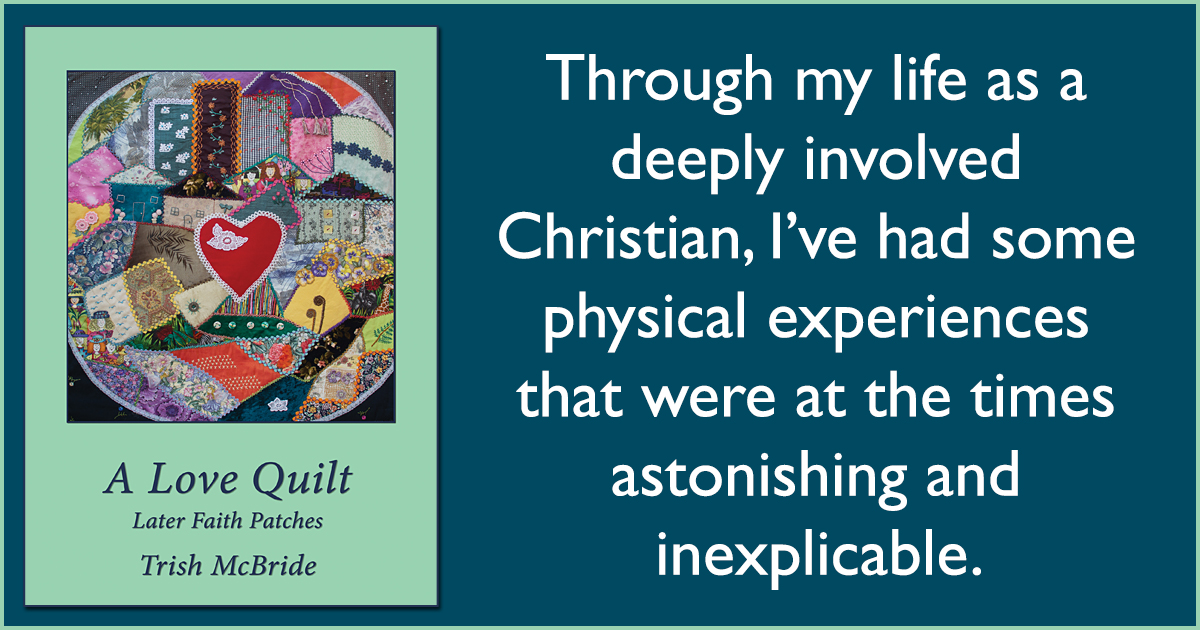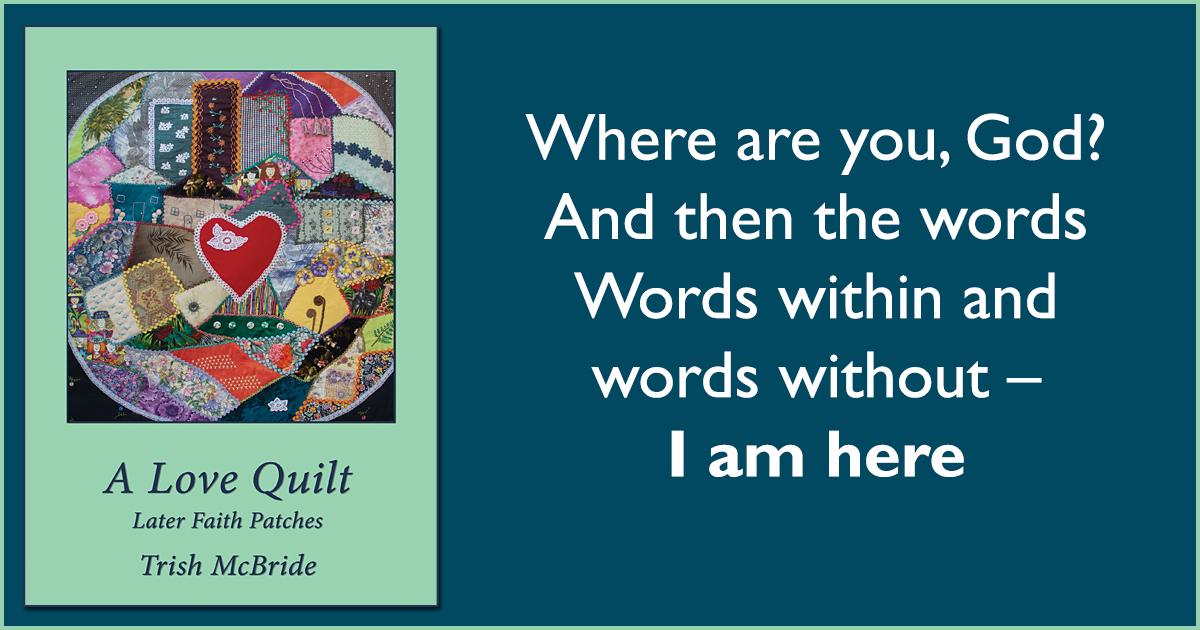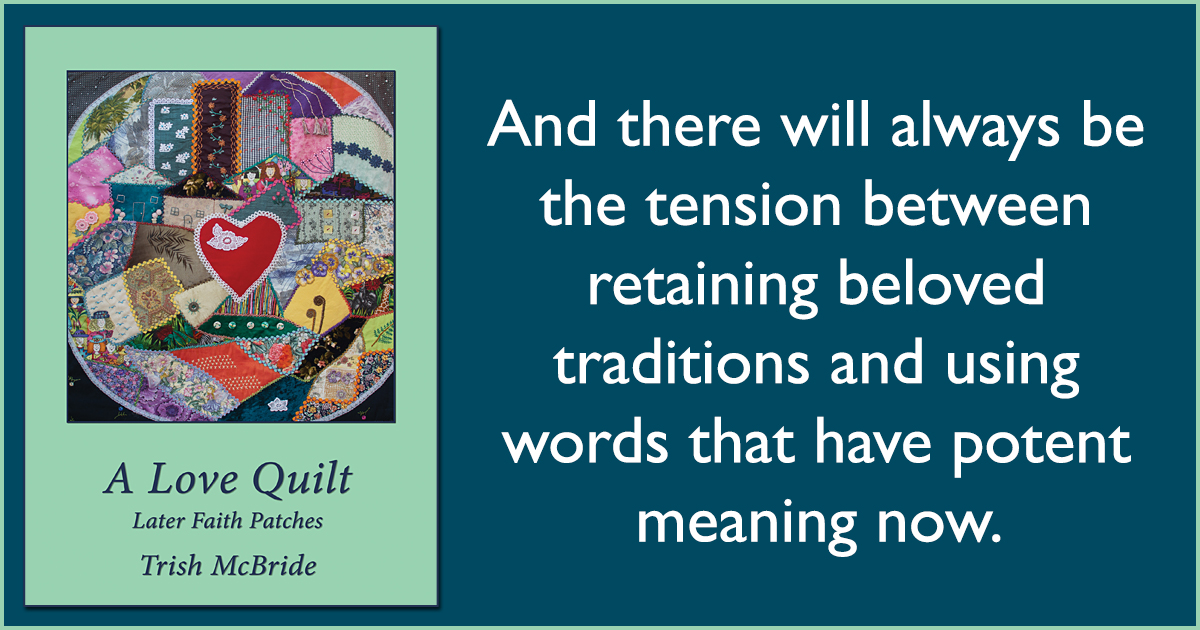
Tag Archives: community-facing ministry
Wisdom from A Love Quilt by Trish McBride – 6
Wisdom from A Love Quilt by Trish McBride – 7
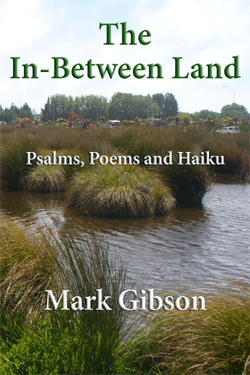
Prayer / Poem of the Week # 19
Prayer / Poem of the Week # 19
Come back each Monday night for a free prayer or poem from one of the books we have published.
Prayer for the Otakaro-Avon River
We gather on the bank to pray for this river
that was here long before us,
and will continue to flow
long after we have gone.
Let us give thanks
for the snow-fed aquifers,
and the peaceful springs
that birth and sustain her life
every day, every moment;
and for the little streams and creeks
that make her stronger
as she flows through our city
towards the sea.
We celebrate the life that is within her –
the micro-vertebrates,
the inanga,
the eels,
the fish…
We rejoice in the beautiful birds
that grace her waters,
that she supports –
the waterfowl and
their songs that are heard
day and night
along her reaches.
We give thanks
for the sustenance she has provided
so generously, constantly
for the people of this place
ever since the first ones came here,
food for body, mind and soul
for generation after generation.
Yet our gratitude and joy
are coloured with sorrow
our spirits are troubled
as we can see with our own eyes
how polluted she has become,
how much she suffers.
We know that she is burdened
by what we have asked her to carry,
and she has lost much of her sparkle
her vitality, her spirit…
Her waters are polluted with the wastes
of the city, chemicals, effluent,
and a tide of human refuse,
debris from a careless throwaway society.
O Creator, forgive our lack of respect
our failure to love and cherish
this beautiful, life-giving river.
We have built a city around her
and asked her to do things
we should never have asked,
we have treated her like a drain,
a convenience, a waste disposable unit
for all the things we don’t want.
We know that it will take
a transformed city
to heal and restore her
to fullness of life.
Transform our hearts and minds,
change us deeply so that we begin
to take responsibility
for our abusive behaviour.
Holy Spirit, count us in,
give us the strength and wisdom,
the aroha and grace
to return the love and life
we have so freely been given.
As she has blessed
may this spirited river
be blessed
by all who live here.
Amen.
— New Brighton 2014
From The In-Between Land: Psalms, Poems and Haiku by Mark Gibson (2015)
Click here to Order Print books and here for eBooks
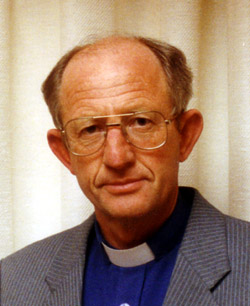
Prayer / Poem of the Week # 10
Prayer / Poem of the Week # 10
Come back each Monday night for a free prayer or poem from one of the books we have published.
41. Thanksgiving for Winter
God of all seasons,
we give you thanks
for the grey wet mornings,
for the cold southerly days,
for the mist that hovers in the hills,
and the fog that blankets the river valleys,
for the fresh snow on the ranges and mountain tops,
for the clear sharp sunny days
that follow the frosts,
for all that makes winter
a time to dress snugly and keep warm.
We give thanks for the reserves
of silage and hay and winter feed
to supplement the needs of stock,
for the long acre and the electric fence,
for the pruning of fruit trees
and grape vines,
for the season of rugby, league and football,
for hockey and netball,
for golf, and for pony club,
for dog trials and other sporting and social events,
for raincoats, swanndris and gumboots,
for roaring fires, hot soup and scones
and safe shelter from winter’s chills.
From The Shepherd’s Call – Te Karanga o te Hēpara:
Prayers and liturgies for rural Aotearoa New Zealand
By Bill Bennett (2018)
Click here to Order Print books and here for eBooks
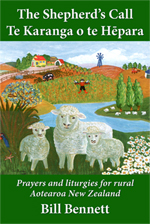
Prayer / Poem of the Week # 4
Prayer / Poem of the Week # 4
Come back each Monday night for a free prayer or poem from one of the books we have published.
33. A Farmer’s Prayer for Daily Work
O God, in the burst of spring growth,
let me rejoice.
In the first plantings of crops,
bring me hope.
In the summer heat,
shade me.
In the dried up hills
water me.
In the harvest work
sustain me.
In the big decisions
guide me.
In the autumn chill
warm me.
In the driving rain
shelter me.
From the howling winds
protect me.
In the slush and mud
encourage me.
In the lonely hours
stand by me.
In the beauty of each dawn,
let me wonder at your creation,
and the peace of the earth.
From The Shepherd’s Call – Te Karanga o te Hēpara:
Prayers and liturgies for rural Aotearoa New Zealand
By Bill Bennett (2018)
Click here to Order Print books and here for eBooks
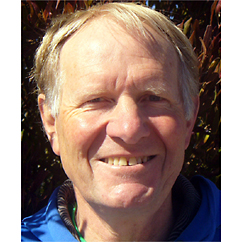
Prayer / Poem of the Week # 1
Prayer / Poem of the Week # 1
Come back each Monday night for a free prayer or poem from one of the books we have published.
Psalm 5
My friends, sometimes the best thing we can do is go to the beach,
or wander into the wetlands, to get close to the divine again.
The challenges we people of the east are dealing with at times seem
as high as the Southern Alps, and they can get us down, really down.
So taking time out of the mire and the mess to restore our waning spirits
is on some days simply essential.
On the beach I can gain a better perspective on things.
The vastness of the ocean reminds me of the immensity of God’s love.
It extends way beyond the horizon that I can see.
There is nothing that I am facing or in the grip of
that God’s love cannot absorb and transform.
When I really listen to the roar of the ocean,
instead of the noise of my thoughts,
I can hear God saying this over and over again.
The surf seems to shout eternally, “L-o-v-e,” in one long rolling sound…
When I feel the fresh, clean wind blowing on my face
there is a sense of being cleansed.
All the heavy things that pollute and clutter my mind
are somehow wonderfully dispersed.
So what I’m really trying to say is that a walk on the beach
can be a holy and healing experience.
As Adam and Eve discovered the divine walking in the Garden,
and Galilee fishermen experienced the same presence
in Jesus walking on the lakeshore,
we too can experience the divine walking with us on New Brighton beach.
It is the go to place when we are looking for new inspiration
and release from things that bind and blind us.
The quiet wetlands are another place to go to get closer to God.
Amongst that great seeping silence there is space to be and meditate.
On a still day all that breaks the silence is the song of birds.
There is something calming and comforting being close
to these beautiful and graceful creatures.
Like the dove that hovered over Jesus
they speak powerfully of the presence of God’s Spirit.
O God, draw us again to the places of beauty and life that surround us.
In these sacred places restore our strength and health.
From The In-Between Land: Psalms, Poems and Haiku by Mark Gibson (2015)
Click here to Order Print books and here for eBooks
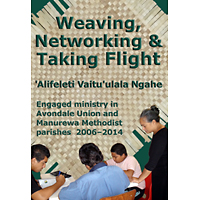
“Church leaders and lay alike will find humble but passionate vision and wisdom here.” Review by Rosemary Dewerse of Weaving, Networking and Taking Flight.
‘Alifeleti Vaitu’ulala Ngahe
Weaving, Networking and Taking Flight: Engaged Ministry in Avondale Union and Manurewa Methodist Parishes 2006-2014
(Wellington: Philip Garside, 2014), 68pp.
Review by:
Rosemary Dewerse, Mission Educator, College of St John the Evangelist, Auckland.
(This review will be published in the December 2015 issue of the
Australian Journal of Mission Studies.)
“In our part of the world where practitioners significantly outnumber academics in the field of missiology, we often do not benefit from their wisdom because they are too busy “doing.” This is especially the case with Pacifica leaders. In this remarkable little book Rev Ngahe, a Tongan Methodist minister working in Auckland, New Zealand, does, however, take the time to pause and record his ministry strategy across 2006-2014, a strategy that because of its deeply contextual and outward-facing commitment exemplifies missional church leadership.
Ngahe’s strategy is straightforward. He seeks out visual images that can capture his own but also his people’s imagination and then explores their riches as he leads his community in building connections within and beyond their own boundaries in service of Christ and the people.
For himself as a Tongan the image of a Fala (a mat woven by one’s family) keeps him humble in reminding him that when he joins a community he joins a history and comes to contribute to that. It keeps him open as a Fala’s purpose is to invite family and others into talanoa (conversation seeking agreed solutions). It also keeps him mindful that when he moves on it is good for the people to be continuing to weave a closely interlaced Fala.
When Ngahe arrived in Avondale, Auckland, in 2006 he found the local icon of the Avondale spider. This got him thinking about the care with which a spider (in his imagination, God) weaves a web that despite the weather holds fast. The legs of the spider he saw as us all doing God’s work in reaching out across the community web through good and difficult times. Such thinking saw him lead the renewal of a rundown church building by seeking and welcoming help offered by likely as well as unlikely groups (eg the NZ Methodist Church, local businesses, the Mormons, the Department of Corrections). The congregation had a vision of being ‘Christ’s light to the community’ by running a homework club as a way to begin reversing endemic unemployment in the area; it was a vision others wanted to support, though there was some discomfort at first amongst parishioners with some of their partners. Though Ngahe left in 2010, the club, and other community activities, continue to this day in the refurbished church.
In Manurewa the image drawn upon was the name of the suburb: in Maori it means “soaring bird.” There, as Ngahe notes, “the listening and storytelling took pictorial shape” (p26). A mural on this corner church was painted with the help of local businesses, community police, local graffiti taggers, and MPs, as well as church members. They and nearly 40 other community groups now see “The Corner of Hope” (the name of the Church) as a place of welcome and belonging for all people. Hospitality and transformation are the two key theological themes underpinning all that happens there.
For Ngahe it is clear that finding a language that embeds God’s mission in the local context and in words and deeds that all people can understand and feel embraced by is crucial. It is exemplified not only in his approach to his ministry but also in the way in which he has written this most accessible book. Church leaders and lay alike will find humble but passionate vision and wisdom here.”
Order now eBooks or Print book
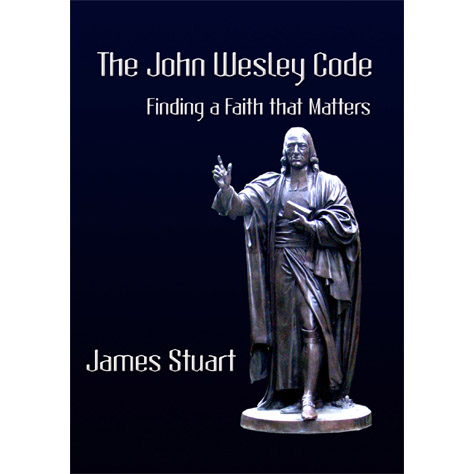
Free Study Guide to The John Wesley Code
Click here for a free PDF download of a 12 Session Study Guide to The John Wesley Code.
Introduction
In The John Wesley Code, James Stuart argues that John Wesley, the founder of Methodism, can help Methodists find a new vision for today if they are prepared to listen and learn from him. He paints a challenging portrait of Wesley, profoundly transformed and driven by the love of God, who chose to stand alongside the poor and dislocated people of his day and offer a message of healing, hope and personal transformation.
Because Wesley was so in touch with the presence of God’s grace and love in his life, he can offer us fresh, new ways for ministry in a post-modern society. This Leader’s Guide helps readers of The John Wesley Code to learn not only about Wesley but to also imagine new ways of being church today. Participants in study groups will have the opportunity to explore first Wesley’s practice of ministry, second his theology of ministry and third consider the kind of people Methodists and others can become because of the love of God at work in their lives. There will be opportunities through the study group for members to share with one another their emerging new visions for the church and to develop deeper relationships with one another that will last far beyond their time together. That is why it is recommended that the final gathering include a shared meal and act of re-dedication to Christian ministry and service.
Starting a Study Group
Format
This study guide is designed for six or twelve weeks of study and exploration using the book The John Wesley Code. The guide recommends twelve weeks to cover the material, however, the guide can be adapted to the needs and time constraints of the group. It is recommended that the first eleven sessions last about one and a half hours. The guide can also be used as a foundation for a weekend retreat alternating the sessions with recreation, rest, other activities and concluding with a meal of celebration.
Helps for Leaders
- Be clear in announcing the time and place of the meetings. Try to meet in a pleasant, comfortable room where chairs can be set in a circle.
- Invite the group to choose their leadership style. One person directing the discussion through the twelve weeks, or two persons working together, or each member taking a session in turn.
- Each session contains several kinds of questions. Some focus on the contents of the book. Do not neglect these for it is important for group members to have some understanding of Wesley’s world. The second set of questions deal with the meaning and implications of Wesley’s ministry. And finally there are some questions which invite participants to share their own ideas and feelings.
- There are no right and wrong answers so participants should feel free to share their ideas without fear of being criticised. Most important is to encourage the expression and exchange of ideas and insights gained from the book.
- It is not imperative that the group address all the questions for each session. Try to focus on those which seem most important to the group.
- Encourage everyone to participate in the conversation and try to avoid having one or two people monopolise the discussion.
- The leader of the group for the session should keep the discussion focused on the questions for the session and if the group goes off on a tangent, gently move the discussion back to the question or move on to the next question.
- Each member of the group should take responsibility for what he/she says and encourage openness and trust by being willing to share. All contributions from group members should be treated with respect and seriousness.
Materials Needed
- The John Wesley Code: Finding a Faith that Matters, James Stuart 2008, Philip Garside Publishing Ltd.
Every member of the group should have their own copy.Print and eBook (Kindle & ePub) copies can be ordered from:
• Philip Garside Publishing Ltd: www.pgpl.co.nz and
• Epworth Books Ltd: sales@epworthbooks.org.nz www.epworthbooks.org.nz
• Kindle eBooks can also be ordered from www.amazon.comNote that this Study Guide is also included as an appendix at the end of the eBook editions.
- Notebook, pen or pencil or other writing paper. Group members might find it helpful to keep a record of the ideas and insights they gain during the 11 (or 12) sessions. These could be shared later with the congregation.
- A light supper of coffee, tea and biscuits may be shared either during or after the session.
- A copy of the Study Guide notes for each session.
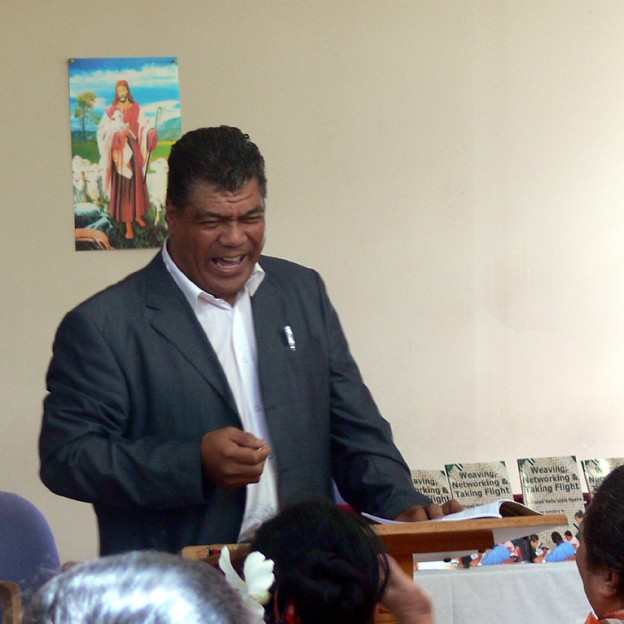
Weaving, Networking & Taking Flight – Book Launch – Avondale
A wide range of church and local community speakers spoke engagingly about Rev Vai Ngahe’s book and his ministry, at the Avondale launch of Weaving, Networking and Taking Flight. They shared thoughtful insights, fun and celebration.
The video is 26 minutes. The frame size is small to keep the file size down. Zoom out a little to get the best result when viewing.

